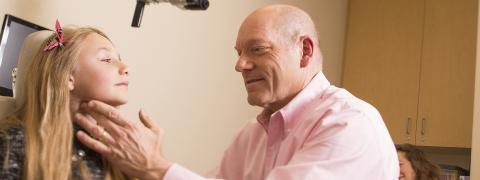 February is Eating Disorders Awareness Month. If you’re wondering what eating disorders have to do with ear, nose and throat health, consider the bulimic. Bulimia nervosa (typically called bulimia) is an eating disorder characterized by eating large amounts of food, followed by purging, often by vomiting. This binging and purging cycle is associated with serious health risks, including problems with the throat. With 1.5 percent of American women suffering from bulimia in their lifetime, the opportunity for serious throat (esophagus) problems presents itself in more than 2,260,000 women.
February is Eating Disorders Awareness Month. If you’re wondering what eating disorders have to do with ear, nose and throat health, consider the bulimic. Bulimia nervosa (typically called bulimia) is an eating disorder characterized by eating large amounts of food, followed by purging, often by vomiting. This binging and purging cycle is associated with serious health risks, including problems with the throat. With 1.5 percent of American women suffering from bulimia in their lifetime, the opportunity for serious throat (esophagus) problems presents itself in more than 2,260,000 women.
What Causes Bulimia?
There is no single cause of bulimia nervosa, but common triggers for the disease may include:
Genetic predisposition–if an individual has a family history of eating disorders, the National Association of Anorexia Nervosa and Associated Disorders estimates they have a higher (30-70 percent) chance of developing an eating disorder.
Mental health issues–the National Eating Disorders Association has shown that 94 percent of those who suffer from eating disorders have a co-occurring psychological condition such as depression, anxiety, obsessive compulsive disorder or substance abuse.
Traumatic or stressful events–according to a study published in the International Journal of Eating Disorders, more than one-third of individuals with bulimia nervosa suffer from post traumatic stress disorder (PTSD), often the result of sexual or physical abuse. Those experiencing other stressful life events or transitions may also try to escape negative feelings through binging and purging.
Societal pressure–the National Eating Disorders Association found that 40-60 percent of elementary school girls “are concerned about their weight or about becoming too fat.” The pressure of cultural expectations, images of “ideal” body types perpetuated by the media, weight shaming, bullying and even participation in certain sports can all play a role in the development of bulimia.
Though bulimia is more common in women–with 1.5 percent of female Americans suffering from bulimia at some point in their lifetime–men can also be bulimic. In fact, it is estimated that .5 percent of American males suffer from bulimia, and they are significantly less likely to seek help for the issue.
If you find yourself engaging in binge/purge cycles, it is absolutely vital to seek both counseling and medical treatment from a trusted health practitioner.
Can Bulimia Cause Throat Problems?
Bulimia is characterized by episodes of excessive consumption of food (binging) followed by an attempt to rid the body of those calories (purging). Purging–also referred to as “compensatory behavior”–may take the form of vomiting, use of laxatives or diuretics and/or excessive exercise.
All forms of purging take a severe physical toll on the body and its vital organs, and vomiting as a result of bulimia can cause throat problems, in addition to a host of other issues.
Repeated or regular vomiting introduces stomach acid into the esophagus and throat, resulting in a number of issues in both the short- and long-term. Effects of bulimia on the throat include scratches at the back of the throat caused by forcing a gag reflex (known as “Russell’s Sign”), stomach acid causes erosion of the pharynx (throat), damage to vocal cords, swelling of salivary glands and weakening or rupture of the esophagus. These problems may manifest themselves as a sore throat, hoarse voice, difficulty swallowing, puffy cheeks and acid reflux.
Because throat problems associated with bulimia can cause future complications and damage, it is important to consult with an ear, nose and throat (ENT) specialist to assess the damage and come up with a treatment plan.
Sore throat
A constant sore throat is one symptom associated with bulimia, a result of repetitive vomiting. When the esophagus is repeatedly exposed to stomach acid and bile, it becomes raw and irritated and may also become inflamed or become infected. This condition can make the voice hoarse and swallowing painful, causing the bulimic to limit fluids and risk dehydration.
Esophageal ulcers
If the esophagus is worn away by the acid present in vomit, an ulcer can develop. Called esophageal or peptic ulcers, these open wounds can be quite painful when eating, drinking or even swallowing saliva. Some esophageal ulcers will bleed, requiring immediate medical attention.
Rupture of the esophagus
The third level of damage to the throat — after sores and ulcers —is an esophageal tear caused by repeated vomiting. The tear often occurs at the mucous membrane that connects the esophagus to the stomach and results in bright red blood being vomited. This kind of tear leads to death if it is not treated quickly. Any time blood is present in vomit or feces, immediate medical help is required.
Treating Bulimia
Damage to the esophagus can be treated. However, full healing is not possible until the bulimic stops vomiting. Ulcers can be treated with medications, including antibiotics. Surgery can usually repair esophageal ruptures. Any treatment will be rendered ineffective if bile and stomach acid continue to flush the throat and more extensive and dangerous damage will occur.
A trained ENT physician can treat the acute esophageal damage, but that is simply the first step. Bulimic patients must undergo counseling that puts a stop to their dangerous behavior to ensure long-term health. Bulimia and its health effects are very serious and can be life threatening. If you or someone you love is suffering from this disorder, seek professional help immediately.
- Education


